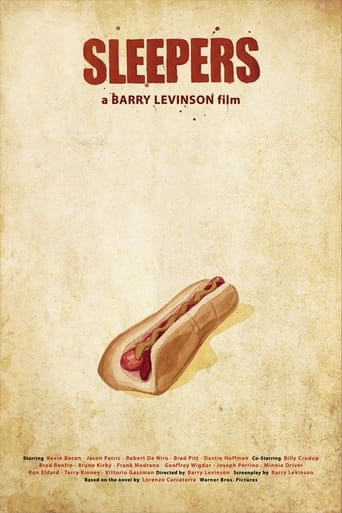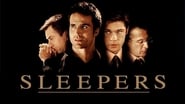classicsoncall
This is a revenge film of a different kind. Characters who have been wronged in childhood band together as adults to mete out punishment to their tormentors under the pretense of the legal system. The story flows fairly logically and consistently right up though the courtroom's closing arguments when a pair of thugs are found not guilty of murder when in fact they did kill a man. The story weaves it's way through childhood escapades in Manhattan's Hell's Kitchen, a boys reformatory where horrible physical abuse takes place, the back room manipulations of a Mafia kingpin, and a courtroom drama in which nothing appears to be what it seems.For the longest time the title of this picture held a different connotation for this viewer. For some reason I though it was a sci-fi film dealing with dream experimentation gone bad. I don't know where that idea came from, perhaps another movie that I can't properly place. The 'sleepers' here refers to anyone who spent any time at all in a juvenile facility like the four young friends we meet here. As a result of a terrible accident resulting from a prank gone way out of control, the boys wind up at the Wilkinson School for Boys and the beginning of a personal nightmare for each of them. More than anything, the story line points to the randomness that can occur in someone's life that will eventually forge a person's future for good or bad, in this case, definitely bad. And I'm not even referring to the murder trial, but to the aftermath as depicted by the closing scenes detailing the fate of all concerned.Robert De Niro portrays perhaps the most conflicted character in the story, that of neighborhood priest, Father Bobby Carillo. In a way, he reminded me of Pat O'Brien's Father Jerry in the 1938 film, "Angels With Dirty Faces". Father Bobby is there for his troubled boys, but is asked to put his priestly obligations on the line in order to clear two of his former charges from a murder rap. The complex issue is handled skillfully by the screenwriter, though many will question the credibility of a priest not only lying, but lying under oath after swearing on the Bible. The one nit-pick I have with the story relates to Father Bobby's testimony when he produced the three Garden basketball tickets. That clearly came so far out of left field that it put a knock on the credibility of the defense argument. How would it have been possible to backtrack the availability of those tickets so long after the events at the restaurant occurred? Had the picture found a different way to corroborate the phony witness story, I might have rated the movie a perfect ten.
allyatherton
Sometimes revenge is the only answerStarring Robert De Nero, Kevin Bacon, Brad Pitt and Dustin HoffmanBased on a book by Lorenzo CarcaterraDirected by and Screenplay by Barry LevinsonThis is another example of something that could have been so much better.I was sat watching this thinking to myself, ' I bet the book is better than this.'There are so many big names in this film and it even has a soundtrack by John Williams, it should have worked but it didn't. There is something that just doesn't work. It felt like the whole movie was crammed together and didn't have room to breathe. We don't get time to get our heads around the story or the individual characters, I spent most of the movie trying to work out which character was which. And just when I was starting to get a grip, we are shoved thirteen years into the future and have to try and work it all out again.Considering the star studded line up, for me it was Dustin Hoffman that came out on top even though he only played a small role. He played to alcohol lawyer with perfection, it's a pity we didn't see any stand out performances by any of the others. I don't know what went wrong. Maybe this movie would have been better served with a different production team or a different director.As for the story itself, it's allegedly based on a true story but that is another story.Watchable but frustratingly disappointing.7/10
Noirdame79
I have a strong memory of first viewing Barry Levinson's film of Lorenzo Carcaterra's controversial novel, which the author insisted was autobiographical, despite detractors who have challenged his claim. Regardless, the story of four childhood friends who pull a foolish stunt that changes their lives forever, remains emotionally powerful for the most part, and certainly there's no denying that situations like have happened and will likely continue to happen. The film loses credibility in the second half, but the impression it leaves will stay with you.The story opens in the 1960s in New York's Hell's Kitchen, which is masterfully re-created. Neighborhood pals Shakes (Joe Perrino), Michael (the tragic Brad Renfro), John (Geoffrey Wigdor) and Tommy (Jonathan Tucker) grow up together in a world that is an odd mix of childhood innocence, religion and organized crime. Their ally is Father Robert "Bobby" Carillo (Robert De Niro, who else?) who tries to guide them and encourage them to see beyond Hell's Kitchen. An enjoyable oldies soundtrack adds to the spirit of the story until things change for the worse for the young protagonists. A prank goes terribly wrong, critically injuring an innocent bystander and the boys find themselves sentenced to do time at the Wilkinson's Home For Boys, a juvenile institution where dangerous offenders are housed. Shakes, Michael, John and Tommy find the grimness of the institution difficult, but that does little to prepare them for the nightmare they end up enduring at the hands of sadistic guards, lead by Sean Nokes (Kevin Bacon, in another villainous turn), and it's easy to despise him and the other guards (played by Terry Kinney, Jeffrey Donovan and Lenny Loftkin respectively) for their brutality towards these vulnerable adolescents. Sexual abuse is implied but not shown graphically, but the disturbing sounds of screaming and the broken looks on the faces of the boys more than gets the point across. I'm always somewhat surprised that many reviews overlook just how effective the child actors are, and how they essentially carry the first half of the film. They are all extremely natural, their rapport is believable, and they convey much more with facial expressions than any dialogue. Brad Renfro's performance is especially poignant in retrospect, not only due to his tragically early death but the strong likelihood that he was victimized himself in real life. It adds a more disturbing and touching aspect to the viewing experience.Fast forward to 1981, and John (now played by Ron Eldard) and Tommy (now portrayed by Billy Crudup, in his film debut) have become hardened criminals and one night they come across Sean Nokes by chance in a pub. They take this opportunity to exact revenge, and both Eldard and Crudup give powerhouse performances. Unfortunately, after that, they take a backseat until the film's conclusion. The same can be said for Minnie Driver, who plays the adult Carol Martinez, who was a companion to the young men in the past and still cares deeply for them. Michael (Brad Pitt in the adult role) and Shakes (Jason Patric, who also provides voice-over narration) are both portrayed by competent actors, but their performances are uneven; at times they seem emotionally invested and other times they just seem to be going through the motions. Michael is now a prosecutor and he uses the case as a way to get revenge in his own way, and to do his best to make sure that his friends are acquitted. But will he be able to pull it off? Robert De Niro remains the constant throughout as the priest who will do anything for his boys, while Dustin Hoffman as defense attorney Danny Snyder has little more than a cameo. Bruno Kirby and Vittorio Gassman give respectable supporting turns, but the film belongs to the child actors, De Niro and to a lesser extent Eldard and Crudup. In some ways, "Sleepers" suffers the same fate as similarly flashback-driven movies such as "Stephen King's It" (1990) and "Now And Then" (1995), where the adult actors aren't nearly as compelling as their child counterparts, despite the talent involved.The questions raised here are valid and worth examining. Surely the trauma of abuse, particularly sexual abuse is extremely damaging and soul-destroying, but is it ever acceptable to take the law into one's own hands? Is vigilante justice the answer or does violence simply beget more violence and bloodshed?True story or not, this is an issue that needs to be addressed on both counts.
Kirpianuscus
performances. script. atmosphere. precise build of each part. a film about justice. and a story who use the references to Count of Monte Cristo as axis for a real gem. because , it could be perceived as version of Alexandre Dumas 's novel. same broken happiness. same cruel punishment. and the way to revenge. and the significant detail of few memorable scenes.a film who remains perfect. for the touching portrait of friendship. for the status of de Niro and Hoffman as pillars and for wise work of the young actors. de Niro does one of the most profound roles because his father Bobby is splendid definition of the Church's mission. a film about truth . dramatic, smart, beautiful in a special way.





